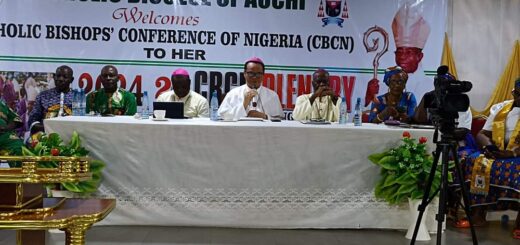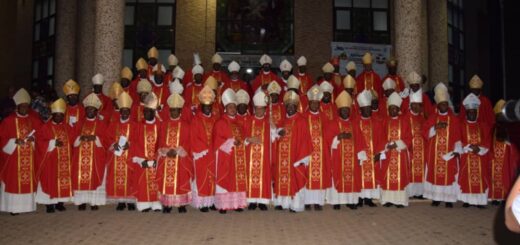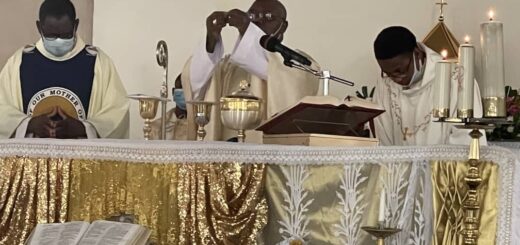Three Levels of Banquet
by ARCH BISHOP · October 11, 2020
28th Sunday Homily by Archbishop I. A. Kaigama, at St. Benedict’s Parish Lokogoma, Abuja, October 11, 2020.
Readings: Is. 25: 6-10; Ps. 22 (23); Phil. 4: 12-14, 19-20; Mt. 22: 1-14
To my dear people of God in St. Benedict’s Parish, Lokogoma, may God bless you now, and forever.
I pray that all of you with your Parish Priest, Rev. Fr. Sixtus Okonkwo, together with his recently posted assistant, Rev. Fr. Boniface Neibo, will continue to enjoy harmony and bear plentiful fruits of peace, love and progress in your parish.
With joy, I congratulate the teachers among you and indeed, in Nigeria, for the good news by President Muhammadu Buhari, on the World Teachers’ Day, during which he approved a special salary scale for teachers, reviewed upward their retirement age to 65 or forty years of teaching before retirement. He promised teachers rural posting allowance, science teachers’ allowance, low-cost houses in rural areas, prompt payment of salaries, timely promotion, etc. This is commendably great news! I appreciate this unprecedented and edifying generosity to teachers by the Federal Government. It is a gesture that will have a very positive impact on our educational system. We hope that its implementation will be transparent and flawless, as the implementation of excellently conceived ideas is always a challenge. We hope too that the President will meticulously follow this noble initiative to its logical conclusion, and that he will extend similar gestures to doctors, unemployed youths, low income earners, rural dwellers, etc. May the Lord will bless our President.
While today’s homily is not about teachers or the President, I thought I should acknowledge this rare ground-breaking initiative.
Last Sunday, using the image of the vineyard, we were taught to live productive lives. Today, we are invited to consider the symbolism of “banquet”. God is presented as that king who invited many to the lavish wedding feast of his son. The invited guests turned down the invitation and instead gave various excuses. Even though Jesus used this parable with reference to the Jews who were the first to have been invited to the banquet of God’s kingdom, but because of their refusal, the invitation was extended to the Gentiles, the story also depicts the eschatological banquet open to all, irrespective of race, gender, economic or political background, provided we are dressed in the garment of righteousness, since according to Lumen Gentium no. 9, God welcomes whosoever fears Him and does what is right.
Prophet Isaiah describes the blessings, happiness and contentment at the Messianic banquet. We are at perfect liberty to say “yes” or “no”. God respects our freedom and does not force us. If we absent ourselves from the banquet or come poorly dressed, the choice is ours. The dress referred to here is of faithfulness, justice, mercy, love, kindness, etc.
I see in today’s readings three levels of banquet:
The banquet of a common humanity: Humanity is supposed to be a big banquet celebration; where we care for one another, support one another, and are sensitive to each other’s needs; not when others are eating and drinking lavishly, while some are hungry and starving. In the banquet of humanity we must be conscious of those who lack among us so that we can share with them.
This is the essence I believe of the most recent encyclical of Pope Francis, titled Fratelli Tutti, released on 4th October, 2020 in which he says, “Our love for others, for who they are, moves us to seek the best for their lives. Only by cultivating this way of relating to one another will we make possible a social friendship that excludes no one and a fraternity that is open to all” (No. 94).
In the banquet of life, no one should be excluded on account of colour, race or status. The Holy Father reminds us of this too when he established the World Day of the Poor in 2016. Like the Good Samaritan, we should overcome prejudices, personal interests, historic and cultural barriers and be co-responsible in creating a society that is able to include, integrate and lift up those who are suffering or facing hardship (cf. FT. no. 77). God, as St. Paul says in the seconding reading, “Will fulfill all our needs, in Christ Jesus, as lavishly as only God can” (Phil. 4:19).
The Banquet of the Eucharist: This is a foreshadowing of that communion we shall share with God at the end of time. Jesus says, he who eats His body and drinks His blood will have eternal life. The Eucharistic banquet is just a small taste, a preview of the heavenly banquet. To participate worthily, we must put on the right garment, which is holiness and virtuous living. Mere Church membership or belonging to pious associations in Church does not guarantee us salvation.
Heavenly Banquet: God invites us to come to the mountain of the Lord where He will prepare a banquet for us, a fellowship with the saints in the banquet of eternal life (cf. Is. 25:6). We shall see the Lord face to face, and His name will be written on our foreheads; the Lord God will be shining on us and we shall reign forever and ever (cf. Rev. 22:4-5).
The point here is that we should not make lame excuses. We should respond promptly and faithfully. Do not postpone your wedding in the Church. Do not believe you are too busy. You cannot be busier than God. Find time for God and His activities. Let us be careful that we do not face ejection like the man who did not appear in the wedding garment.
As many will soon be concerned with Christmas dresses, we should not forget that the most important dress is the garment of holiness.
During October, the month of Mary, let us in our devotions pray for purity of heart, mind and body.




